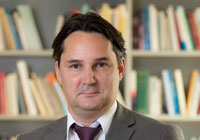
Photo credits:
Danish Saroee
David Dunér
Natural Sciences Fellow, SCAS.
Professor of History of Science and Ideas, Lund University
David Dunér is Professor of History of Science and Ideas at Lund University. His research focuses
on the history and philosophy of astrobiology, the concept of life, and the emergence and distribution
of life. His latest publications concern historical and epistemological studies on biosignatures that could
be found in the geological record or through spectral analysis of distant planetary atmospheres. He is
currently a member of the management committee of the European Astrobiology Institute (EAI), leading
the working group on historical, philosophical, societal and ethical issues in astrobiology.
Among his astrobiology-related publications is the edited book The History and Philosophy of Astrobiology:
Perspectives on Extraterrestrial Life and the Human Mind (2013). He has also been guest editor of special
issues of the journals Astrobiology (2012) and International Journal of Astrobiology (2016). He is an affiliated
researcher in cognitive semiotics, which has resulted in the edited volumes Human Lifeworlds: The Cognitive
Semiotics of Cultural Evolution (2016) and Cognitive History: Mind, Space, and Time (2019). As a historian,
he has published a number of works on especially eighteenth-century history of science, for example The
Natural Philosophy of Emanuel Swedenborg: A Study in the Conceptual Metaphors of the Mechanistic World-
View (2013).
At SCAS, he will work on a project entitled “Signs of Life: The Epistemology of Remote Indirect Sensing”.
The project examines the epistemological problems associated with the interpretation of biosignatures. How
can we be sure we have found signs that refer to actual biological processes, and how can we rule out other
explanations for these signs? The project will analyse historical records and interpretations, as well as con-
temporary and future attempts to detect signs of life.
This information is accurate as of the academic year 2020-21.






